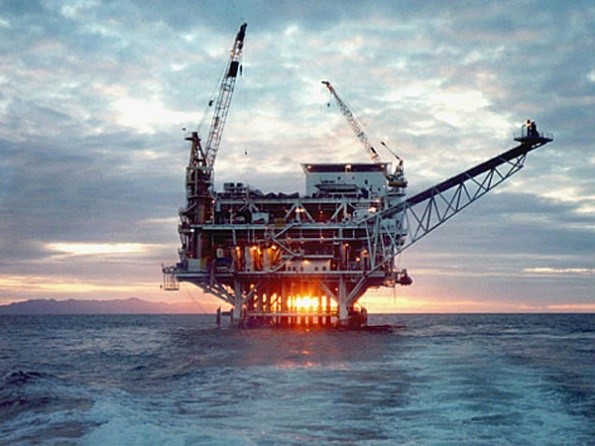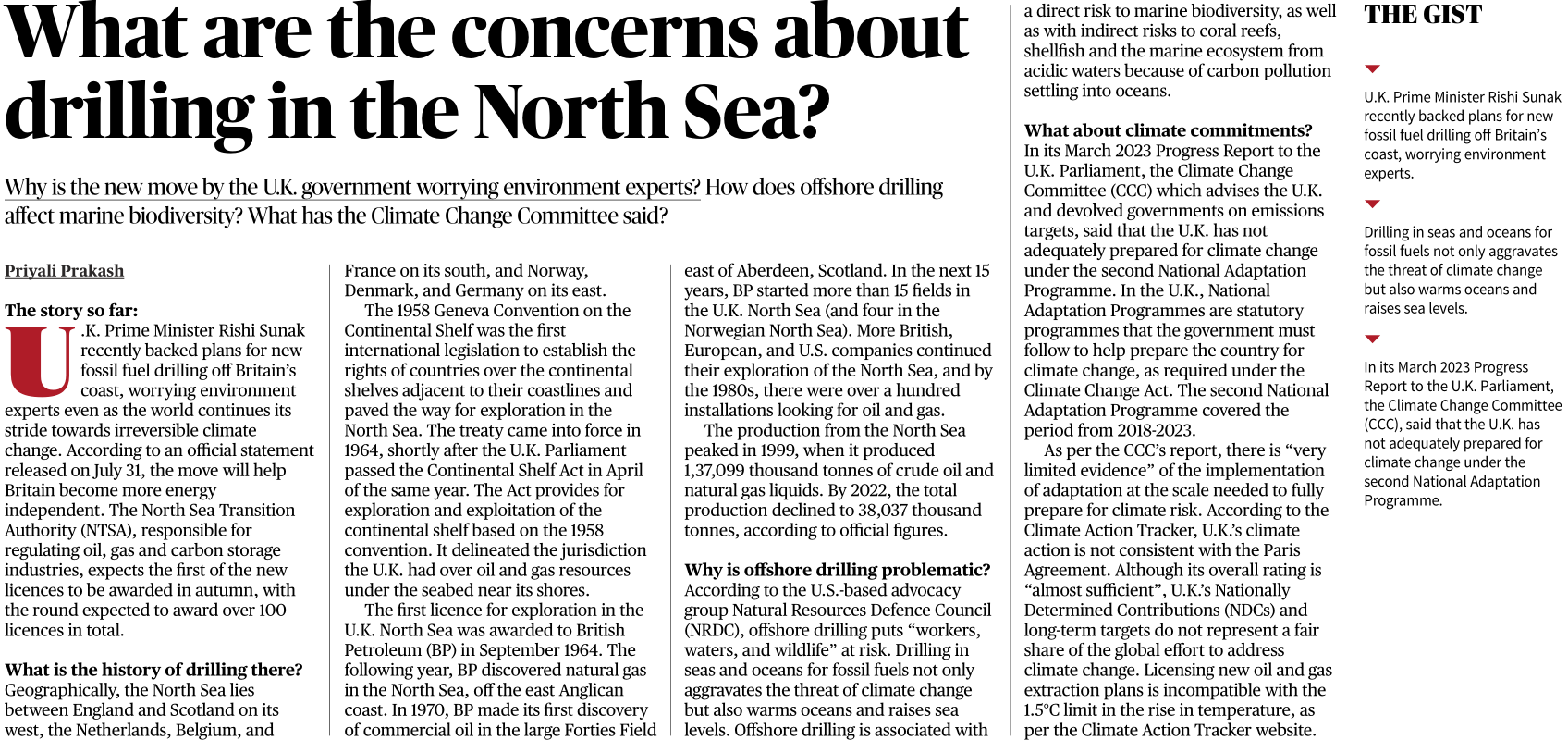Description

Disclaimer: Copyright infringement not intended.
Context
- K. Prime Minister Rishi Sunak recently backed plans for new fossil fuel drilling off Britain’s coast, worrying environment experts even as the world continues its stride towards irreversible climate change.
Offshore Drilling
- Offshore drilling is the process of extracting petroleum and natural gas from the seabed using a fixed or mobile platform located off the coast in the open ocean and deepwater regions.
Detailed Article on Deep Sea Mining: https://www.iasgyan.in/daily-current-affairs/deep-sea-mining-31#:~:text=What%20is%20Deep%2Dsea%20mining,energy%2C%20electronics%2C%20and%20biotechnology.
Offshore Drilling Pros
Increased Oil Production
- Offshore drilling greatly increases the oil production and the amount of oil that we have to use for fuel and energy. This stimulates the economy and keeps our society going.
More Jobs
- Offshore drilling requires many skilled people to operate the equipment.
- It creates an entire world of jobs that benefit thousands of people and their families.
- There are entire towns set up to revolve around and cater to the offshore drilling workers.
Self Supporting
- The oil drilling that happens offshore brings in an abundance of petroleum, a fossil fuel necessary for most everyday functions. We rely heavily on foreign countries to supply us with enough fuel to function.
- With offshore drilling we can gain a better state of independence and not be so vulnerable to outside influences.
Lower Oil Prices
- If oil is being produced on home soil, then foreign countries have no say in the prices of the oil, which are often inflated. Transportation costs are also cut drastically with offshore drilling, further lowering the price for oil.

Offshore Drilling Cons
Associated with numerous potential environmental hazards.
- The deepwater horizon incident killed 11 people and exposed more than 45,000 square miles of the gulf of mexico to crude oil. Exposure to crude oil in just small amounts is toxic to most forms of marine life.
- In this one incident, 4.9 million barrels of oil spilled into gulf waters. More than 15,000 bird species, 1,200 fish species, 2,900 mollusc and crustacean species, and 29 marine mammal species were threatened by this incident.
Expensive Facilities
- The equipment and rigs that are necessary to complete the process of offshore drilling is very expensive. It also takes a lot of people and training to efficiently and safely run these operations. These costs are often shifted down to taxpayers.
Creates A Pollution Hazard
- As part of the supply chain that begins with offshore drilling, the oil produced by these activities is a major source of several air pollutants, including carbon dioxide, carbon monoxide, hydrogen sulfide, particular matter, and sulfur dioxide.
- Some of the chemicals which are released during the refinement process are known carcinogens.
Creates Health Issues
- Just because offshore drilling platforms are out at sea does not mean they do not impact living conditions on land.
- The various pollutants that are created by these platforms, including the air emissions, are known to aggravate some respiratory conditions, like childhood asthma. They may be responsible for some developmental or reproductive health issues as well.
- The chemicals used in the supply chain can also impact the health of the water around the platform, in groundwater tables, and other access points.
May reduce jobs in other industries
- The presence of offshore drilling may encourage some job development, but it also reduces job development in other industries. The hospitality industry is often the first affected when offshore drilling is developed in a community.
- Platforms create a negative visual impact on the horizon for those looking to enjoy a beach. The effects of pollution can make it difficult to go outside. Some people do benefit with better wages because of this industry. Others can struggle to simply survive.

Oil Spills
- Major oil spillage from offshore drilling is a very real possibility, that has happened before. These spills cause catastrophic damage to the environment and marine life in the ocean.
High Carbon Emissions
- The drills that are used to drill into the seabed cause a very high amount of carbon emissions to be put into the atmosphere. This impacts our environment and further contributes to the growing global warming problem.
High-Risk Job
- Working on an off shore oil rig is very dangerous, there are many risks involved including fires and drowning.
- The rigs are very far from emergency services, making it hard to provide quick assistance to a worker in need.
Food Chain Problems
- It is inevitable that a small amount of oil is spilled into the ocean during drilling, this oil contaminates the water, which in turn contaminates the fish. It may start with the small fish, even plankton, but the fuel remnants will remain in them. As you move up the food chain, the contamination may dwindle, but still be present.
Does not resolve the question of international dependency.
- Just because offshore drilling is authorized does not mean that the platform will become productive. Domestic demand can change over time as well, which means the new platform would not cut into the usage gap being experienced.
- Although offshore drilling can increase overall domestic supplies, it is not a guarantee that foreign dependence on oil will be eliminated. In some instances, foreign dependence may not even be diminished, despite the presence of offshore drilling.
Sustainable Alternatives to Unfettered Offshore Drilling
Support Ocean Planning
- A great way to prevent unfettered offshore drilling is to formulate an ocean management plan to better understand the tradeoffs of offshore development and to help identify locations for renewable energy projects.
- This means taking into account sensitive marine areas and travel routes, beloved recreational areas and surf spots, highly valued fishing spots and economic centers, as well as the multitude of other important uses of our coasts and oceans.
- Documenting this information is the first step in a planning process that takes into account a lot of stakeholder input and the actual conditions of our oceans.
Renewable Energy Sources
- Renewable energy sources such as solar, wind, and geothermal power are another option for offshore drilling. These sources of energy are far less harmful to the environment than oil and gas, and they may be used without drilling.
- To harness the power of the wind, solar panels can be installed on land, and offshore wind turbines can be installed in the ocean. Drilling wells into the earth to tap into the heat energy released by the Earth’s core can also be used to generate geothermal power.
Biofuels
- Biofuels are another alternative to offshore drilling. Biofuels are organic resources obtained from crops, algae, and waste items that can be used to power cars and other vehicles. Biofuels, unlike oil and gas, are renewable and do not emit harmful emissions when burned.
- Furthermore, biofuels can be generated locally, reducing the need for oil and gas to be transported over vast distances.
Energy-Saving and Efficiency Initiatives
- Finally, energy-saving and efficiency initiatives can help to lessen the need for offshore drilling. We can minimize the demand for oil and gas by consuming less energy and preserving resources, which lessens the need for drilling. Energy-efficient homes and appliances, public transit, and carpooling are all examples of this.

MUST READ ARTICLES:
OFFSHORE AREAS MINERALS (DEVELOPMENT and REGULATION) AMENDMENT BILL 2023: https://www.iasgyan.in/daily-current-affairs/offshore-areas-minerals-development-and-regulation-amendment-bill-2023
SHALLOW WATER MINING: https://www.iasgyan.in/daily-current-affairs/shallow-water-mining
|
PRACTICE QUESTION
Q. What do you understand by the concept of “Offshore Drilling”? How does offshore drilling affect the environment? Suggest sustainable alternatives to unfettered Offshore Drilling.
|













